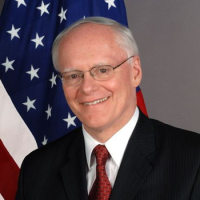On Thursday, February 24, Russia launched a series of missile attacks against locations near Ukrainian capital Kiev, an assault that quickly spread across the country by land, sea, and air. The enormity of the Russian attack, not just on Ukraine but on the long-term global security order, is increasingly clear among states in the Middle East region, and puts pressure on the ‘hedging’ between the U.S. on one hand and Russia and China on the other, commonplace in recent years.
While Middle East countries, including the US' close military and diplomatic partners UAE and Israel, initially hedged their bets between the two superpowers, the continued Russian aggression has pushed almost all into the Ukraine camp. Turkey has been particularly vocal from Presidant Erdogan supporting Ukraine bilaterally and in NATO, and then taking the unprecedented step of restricting Russian naval transport of the of the Bosphorous Straits under the "war" clause of the Montreux Straits Convention, which Turkey controls.
The regional shift can be seen in the UN General Assembly, where on March 2, 141 countries voted in favor of the UN GA resolution to condemn Russian forces. From MENA, Tunisia, Libya, Egypt, Saudi Arabia, Yemen, Oman, the UAE, Qatar, Kuwait, Bahrain, Israel, Jordan, Lebanon, and Turkey voted "Yes", Syria voted "No", and Algeria, Iraq, and Iran abstained. Algeria has long been pro-Moscow and Iraq, given its internal situation, avoids taking sides. Syria's vote is not unexpected. Iran, however, clearly seeing itself as a potential target of attack, abstained rather than supported its partner Russia, not so much for Ukraine but for the principle of non-interference in soverign states.
A region (mostly) united
Initially, most Arab governments maintained a neutral stance on the Russian invasion of Ukraine, unsurprisingly, given their reticence to pick a side that they believe may jeopardize their relations with either the United States and the Europeans and their equally strategic relations with Russia. In a statement delivered by Saudi UN representative Mohammed Abdulaziz Alateek at the General Assembly, the GCC countries confirmed “the depth of relations” they have with both parties and called on “all parties to exercise restraint.” Nevertheless, Saudi Arabia remains firm in standing with its OPEC+ agreement that is keeping oil prices high rather than pump more crude oil to help the United States and the West, at America’s insistence. Whether the Kingdom maintains this position or contributes to bringing oil prices down in the weeks to come remains to be seen and depends on how far Putin goes in Ukraine.
The notable exception to the neutral Arab stance is of course Syria, whose President Bashar Al Assad reiterated his support of Russia in his call to President Putin and called the Russian invasion in Ukraine a “correction of history.” A staunch ally of Russia, that kept him power since the beginning of the Arab uprisings, the Syrian President will likely feel emboldened by a seemingly ‘stronger’ Russia, which also gives other regional powers, namely Iran, more opportunities to strengthen its influence in Syria and destabilize the neighborhood.
Leaders across the region react
Egypt
On February 25 via Twitter, Egypt's Minister of Foreign Affairs (unofficial translation from Arabic to English): “The Arab Republic of Egypt is following with deep concern the successive developments regarding the situation in Ukraine, and affirms the importance of upholding dialogue and diplomatic solutions, as well as endeavors that would hasten the political settlement of the crisis in a manner that preserves international security and stability, and ensures that the situation does not escalate or deteriorate, and thus to avoid aggravating humanitarian and economic conditions, with their impacts on the region and worldwide.”
Iran
On February 22, Iran’s Foreign Ministry Spokesman Saeed Khatibzadeh commented on that the latest developments in Ukraine, noting, "interference and provocative measures by NATO and led by the US have made things more complicated in this region.” Via Twitter on February 24, Iran's Foreign Ministry tweeted: "The #Ukraine crisis is rooted in NATO's provocations. We don't believe that resorting to war is a solution. Imperative to establish ceasefire & to find a political and democratic resolution."
Israel
On February 27, Israeli PM Naftali Bennett spoke with Russian President Vladimir Putin, offering Israel's support as a mediator in the crisis. On February 24 Israel's Foreign Minister Yair Lipid stated: "The Russian attack on Ukraine is a serious violation of the international order. Israel condemns the attack, and is ready and prepared to provide humanitarian assistance to the citizens of Ukraine. Israel is a country that has experienced wars, and war is not the way to resolve conflicts.”
Jordan
On February 24, Jordan said it is following with "concern" the current developments in Ukraine, and called on the international community and the parties to the conflict to exert maximum efforts for restraint and de-escalation. In a statement, the Kingdom's Ministry of Foreign Affairs called for a peaceful settlement of the conflict and the restoration of security and stability in the region through dialogue and negotiations in these "critical" times. The statement cited Jordan's ambassador to the United Nations Mahmoud Hmoud during a UN General Assembly session, held late Wednesday to discuss the "situation in the temporarily occupied territories of Ukraine", as saying that "Jordan underscores the positive and effective role of the UN and the stakeholders to reach that goal". The envoy stressed Jordan's call for respecting the international law, the UN Charter, the sovereignty and regional integrity of states and the principles of good neighborliness.
Lebanon
On February 24, Lebanon's Minister of Foreign Affairs and Emigrants Abdullah Bou Habib condemned the invasion.
Qatar
On February 25, Qatar's Secretary-General of the Ministry of Foreign Affairs Dr. Ahmed bin Hassan Al Hammadi met with Ambassador of Ukraine to Qatar Andrey Kosmenko to review bilateral cooperations. On February 24, Deputy Prime Minister and Minister of Foreign Affairs Sheikh Mohammed bin Abdulrahman Al-Thani held a phone call with Russia's Minister of Foreign Affairs Sergey Lavrov, followed by Ukrainian Minister of Foreign Affairs Dmytro Kuleba. According to Qatar's State News Agency, Sheikh Al-Thani, "expressed the Qatar's concern over this escalation and its repercussions [and] urged all parties to exercise restraint and resolve the dispute through constructive dialogue and diplomatic methods."
Turkey
On February 25, President Tayyip Erdoğan responded to reporters that, "NATO should have taken a more decisive step." On February 24, Turkey’s Ministry of Foreign Affairs released the statement: "We consider the military operation launched by the Armed Forces of the Russian Federation against Ukraine unacceptable and reject it. This attack, beyond destroying the Minsk agreements, is a grave violation of international law and poses a serious threat to the security of our region and the world. Believing in the necessity to respect the territorial integrity and sovereignty of countries, Türkiye is against changing of borders by use of arms. We call on the Russian Federation to immediately stop this unjust and unlawful act. Our support for the political unity, sovereignty and territorial integrity of Ukraine will continue."
United Arab Emirates
On March 1, the UAE suspended visa-free travel for Ukrainians and abstained from the United Nations resolution condemning Russia for the invasion. On February 27 via Twitter, UAE senior politician Anwar Gargash affirmed the country will not declare sides in the war. On Wednesday, February 23 the Minister of Foreign Affairs Sheikh Abdullah bin Zayed conducted a phone call with Russia’s Minister of Foreign Affairs to discuss their strategic partnership.
Authors

Former ambassador to Iraq and Turkey, and Special Envoy to the Global Coalition To Defeat ISIS


Middle East Program
The Wilson Center’s Middle East Program serves as a crucial resource for the policymaking community and beyond, providing analyses and research that helps inform US foreign policymaking, stimulates public debate, and expands knowledge about issues in the wider Middle East and North Africa (MENA) region. Read more

Explore More
Browse Insights & Analysis
Insights: Ambassador David Hale – The Middle East & the U.S. National Security Strategy





